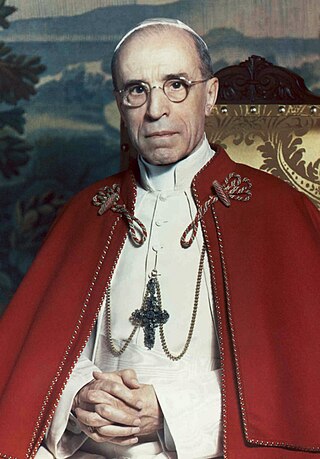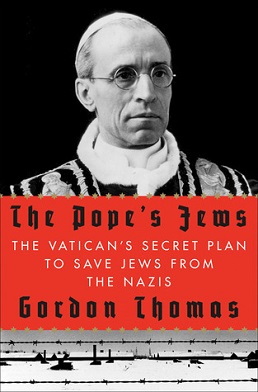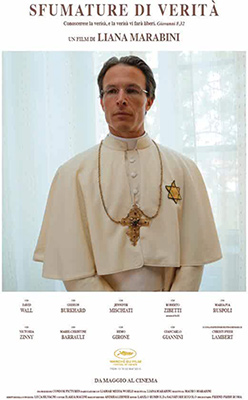Related Research Articles

Pope Pius XII was head of the Catholic Church and sovereign of the Vatican City State from 2 March 1939 until his death in October 1958. Before his election to the papacy, he served as secretary of the Department of Extraordinary Ecclesiastical Affairs, papal nuncio to Germany, and Cardinal Secretary of State, in which capacity he worked to conclude treaties with various European and Latin American nations, including the Reichskonkordat treaty with the German Reich.

David Israel Kertzer is an American anthropologist, historian, and academic, specializing in the political, demographic, and religious history of Italy. He is the Paul Dupee, Jr. University Professor of Social Science, Professor of Anthropology, and Professor of Italian Studies at Brown University. His book The Pope and Mussolini: The Secret History of Pius XI and the Rise of Fascism in Europe (2014) won the 2015 Pulitzer Prize for Biography or Autobiography. From July 1, 2006, to June 30, 2011, Kertzer served as Provost at Brown.

Hitler's Pope is a book published in 1999 by the British journalist and author John Cornwell that examines the actions of Eugenio Pacelli, who became Pope Pius XII, before and during the Nazi era, and explores the charge that he assisted in the legitimization of Adolf Hitler's Nazi regime in Germany, through the pursuit of a Reichskonkordat in 1933. The book is critical of Pius' conduct during the Second World War, arguing that he did not do enough, or speak out enough, against the Holocaust. Cornwell argues that Pius's entire career as the nuncio to Germany, Cardinal Secretary of State, and Pope, was characterized by a desire to increase and centralize the power of the Papacy, and that he subordinated opposition to the Nazis to that goal. He further argues that Pius was antisemitic and that this stance prevented him from caring about the European Jews.

The Myth of Hitler's Pope: How Pope Pius XII Rescued Jews from the Nazis is a 2005 book by American historian and Rabbi David G. Dalin. It was published by Regnery Publishing.
The International Catholic–Jewish Historical Commission was a body appointed by the Holy See's Pontifical Commission for Religious Relations with the Jews in 1999. With three Jewish and three Catholic scholars, the group evaluated Actes et documents du Saint Siège relatifs à la Seconde Guerre Mondiale, 11 volumes of the Vatican's wartime documents devoted to Pope Pius XII. In October 2000, the group issued a preliminary report with 47 questions on the Vatican's response to the Holocaust.
Under His Very Windows: The Vatican and the Holocaust in Italy is a book by Susan Zuccotti which examines the role of the Catholic Church in providing aid to Jews in Italy during the Holocaust, and is critical of the actions of the papacy in this regard.

The papacy of Pius XII began on 2 March 1939 and continued to 9 October 1958, covering the period of the Second World War and the Holocaust, during which millions of Jews were murdered by Adolf Hitler's Germany. Before becoming pope, Cardinal Pacelli served as a Vatican diplomat in Germany and as Vatican Secretary of State under Pius XI. His role during the Nazi period has been closely scrutinised and criticised. His supporters argue that Pius employed diplomacy to aid the victims of the Nazis during the war and, through directing his Church to provide discreet aid to Jews and others, saved hundreds of thousands of lives. Pius maintained links to the German Resistance, and shared intelligence with the Allies, but at the same time he developed alliances with Nazi Germany and Fascist Italy and even arranged secret negotiations with Hitler's envoys. His strongest public condemnation of genocide was, however, considered inadequate by the Allied Powers, while the Nazis viewed him as an Allied sympathizer who had dishonoured his policy of Vatican neutrality.
Pope Pius XII's response to the Roman razzia, or mass deportation of Jews, on October 16, 1943, is a significant issue relating to Pope Pius XII and the Holocaust. Under Mussolini, no policy of abduction of Jews had been implemented in Italy. Following the capitulation of Italy in 1943, Nazi forces invaded and occupied much of the country, and began deportations of Jews to extermination camps. Pius XII protested at diplomatic levels, while several thousand Jews found refuge in Catholic networks, institutions and homes across Italy, including in Vatican City and Pope Pius' Summer Residence. The Catholic Church and some historians have credited this rescue in large part to the direction of Pope Pius XII. However, historian Susan Zuccotti researched the matter in detail and states that there is "considerable evidence of papal disapproval of the hiding of Jews and other fugitives in Vatican properties."
Three Popes and the Jews is a 1967 book by Pinchas Lapide, a former Israeli Consul to Milan, who at the time of publication was a deputy editor in the Israeli Prime Minister's press office. The "three popes" are Pope Pius XII (1939–1958), Pope John XXIII (1958–1963), and Pope Paul VI (1963–1978).
Pope Pius XII's 1942 Christmas address was a speech delivered by Pope Pius XII over Vatican Radio on Christmas 1942. It is notable for its denunciation of the extermination of people on the basis of race, and followed the commencement of the Nazi Final Solution program to exterminate the Jews of Europe. The significance of the denunciation is a matter of scholarly debate.

Vatican City pursued a policy of neutrality during World War II under the leadership of Pope Pius XII. Although the city of Rome was occupied by Germany from September 1943 and the Allies from June 1944, Vatican City itself was not occupied. The Vatican organised extensive humanitarian aid throughout the duration of the conflict.
Yad Vashem, the state of Israel's official Holocaust memorial, has generally been critical of Pope Pius XII, the pope during The Holocaust. For decades, Pius XII has been nominated unsuccessfully for recognition as Righteous Among the Nations, an honor Yad Vashem confers on non-Jews who saved Jewish lives during the Holocaust altruistically and at risk to their own lives.
The public statements of Pope Pius XII on the Holocaust, or lack thereof, are one of the most controversial elements of the historical debate about Pope Pius XII and the Holocaust. Pius XII's statements have been scrutinized as much, if not more, than his actions during the same period. Pius XII's statements, both public and private, are quite well documented in the Vatican Secret Archives; eleven volumes of documents from his papacy were published between 1965 and 1981 in Actes et documents du Saint Siège relatifs à la Seconde Guerre Mondiale.
The Catholic Church and the Holocaust, 1930–1965 is a book written by American historian Michael Phayer on the topic of Pope Pius XII and the Holocaust. It was published in 2000.
Sister Margherita Marchione was an American Roman Catholic sister, writer, teacher and apologeticist, who dedicated herself in her later years to the defense of Pope Pius XII.
The canonization process of Pope Pius XII dates to shortly after his death in 1958. He was declared a servant of God in 1990 and venerable in 2009. Father Peter Gumpel was the relator of Pius XII's cause for canonization. The potential beatification of Pius XII has raised concern, especially by Jewish organisations, because of his controversial record during the Holocaust. The objections especially arise because of the refusal by the Vatican to allow independent access to the Vatican's archives for the period of Pius XII's papacy.

The Assisi Network was an underground network in Italy established by Catholic clergy to protect Jews during the Nazi Occupation. The churches, monasteries, and convents of Assisi served as a safe haven for several hundred Jews.

The Pope's Jews: The Vatican's Secret Plan to Save Jews from the Nazis is a 2012 book by the British author Gordon Thomas concerning the efforts of Pope Pius XII to protect Jews during the Nazi Holocaust. The Observer reported in 2013 that "Gordon Thomas, a Protestant, was given access to previously unpublished Vatican documents and tracked down victims, priests and others who had not told their stories before" and had uncovered "evidence on Pius XII's wartime efforts to save Jewish refugees".

Shades of Truth is an Italian movie, created and directed by Liana Marabini in 2015, about the life of Pope Pius XII and his relation with Nazi Germany. Its world premiere took place at the Vatican City on March 2, 2015, marking the anniversary of the birth of Eugenio Pacelli in 1876 and his appointment as Pope Pius XII in 1939. It was released in movie theaters all over the world in April 2015 and screened at the Cannes Film Festival in May of the same year. According to the director, Liana Marabini, Pope Piux XII saved at least 800,000 Jews.
The Pius War refer to debates over the legacy of Pope Pius XII and his actions during the Holocaust. The phrase was first coined in a 2004 book of the same name.